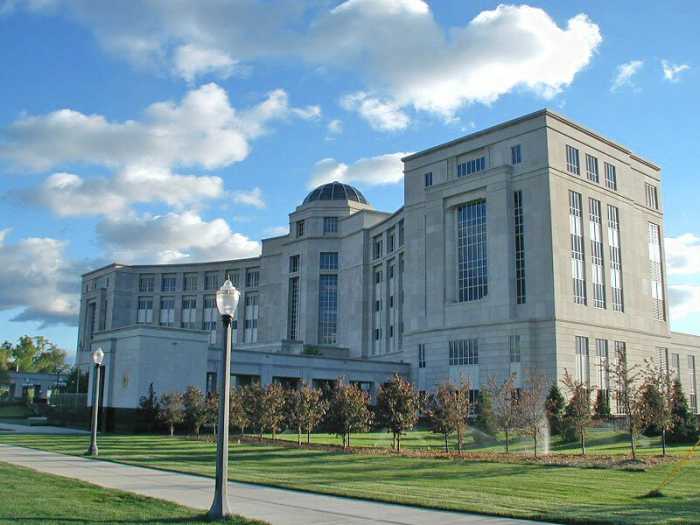One of the most senior members of the federal trial bench, 88-year-old Robert J. Bryan of the District of Washington, and one of its newest additions, District Judge Charlotte N. Sweeney of the District of Colorado, both issued important rulings on December 19 advancing LGBTQ rights.
Judge Bryan, who was appointed by President Ronald Reagan and began serving in 1986, granted summary judgment to the plaintiffs in CP v. Blue Cross Blue Shield of Illinois, finding that the defendant, which administers almost 400 employee health insurance plans across the United States, is violating the Affordable Care Act by enforcing health insurance contract provisions that exclude coverage for gender-affirming care for transgender people. Because Judge Bryant certified the case as a “class action” on behalf of those similarly situated to the named plaintiffs, a 17-year-old transgender boy and the boy’s mother represented by Lambda Legal, his injunction may extend coverage to thousands of transgender people whose health care is administered by the defendant.
Judge Sweeney, who was appointed by President Joe Biden and began serving this year in July, denied a preliminary injunction to the plaintiff in Chiles v. Salazar, in which a licensed professional counselor sued Colorado officials seeking to block enforcement of the Minor Therapy Conversion Law, a state statute that prohibits licensed counselors from performing conversion therapy on minors. Judge Sweeney held that Kaley Chiles was unlikely to prevail on her claim that the law violates her constitutionally protected freedom of speech and free exercise of religion, or that it is unconstitutionally vague and thus unenforceable.
Both opinions are consequential because they deal with subjects about which federal courts are divided.
In order to rule against Blue Cross, Judge Bryan had to find that the Affordable Care Act’s anti-discrimination provision, Section 1557, forbids discrimination by insurance companies that administer health insurance plans for employers on the basis of gender identity. Section 1557 specifies forbidden grounds of discrimination by referring to other federal laws. In this case, Lambda Legal argued that Title IX, one of the listed laws, which forbids discrimination by educational institutions on the basis of sex, should be interpreted to cover gender identity discrimination, as the Supreme Court in 2020 ruled in Bostock v. Clayton County that the ban on sex discrimination in employment includes discrimination because of an individual’s transgender status. Judge Bryan accepted Lambda’s argument.
Furthermore, he rejected Blue Cross’s argument that because it was merely administering programs whose coverage was determined by the employers when they set up their self-funded health plans, Blue Cross was not itself engaged in health care activities within the meaning of the law and could not be held responsible for the employers’ decisions. The judge found that the ACA by its own terms extends to insurance companies, even if they are not underwriting the risk of claims, and by refusing to authorize payment for gender-affirming procedures, they were violating Section 1557, even though their duty under the Employee Retirement Income Security Act (ERISA) is to administer plans in accordance with their terms. Bryan found that the ACA’s specific anti-discrimination provision takes priority over the more general ERISA duty.
Judge Sweeney’s ruling specifically rejected Ms. Chiles’ reliance on a decision by the Atlanta-based 11th Circuit Court of Appeals, which had ruled unconstitutional attempts by local governments in Florida to outlaw the performance of conversion therapy on minors. The 11th Circuit ruled that because the counselors represented that their “therapy” was provided entirely by talking, it was protected speech under the First Amendment and should be struck down as a content-based prohibition of speech that was not justified by a compelling government interest.
Taking her cue from earlier Ninth Circuit rulings that had rejected free speech challenges to similar conversion therapy bans in other states, Judge Sweeney concluded that Colorado was regulating medical practice, only incidentally affecting speech because that was how counselors engage in the conduct of conversion therapy. Colorado is in the 10th Circuit, which does not have a precedential ruling on this question, leaving the judge free to decide which rulings from other circuits to follow.
“The Minor Therapy Conversion Law is viewpoint neutral and does not impose content-based speech restrictions,” she wrote. “It is a public health law that regulates professional conduct. Any speech affected by the Minor Therapy Conversion Law is incidental to the professional conduct it regulates.” Thus, strict scrutiny by the court does not apply, and the law can be upheld if it has a rational basis.
“Defendants have a legitimate and important state interest in the prevention of ‘harmful therapy known to increase suicidality in minors,’ the judge wrote, quoting from a Ninth Circuit precedent. “The legitimacy and importance of the interest underpinning the Minor Therapy Conversion Law is undisputable,” she continued. “Surely, a state’s interest in protecting the psychological and physical health of its minor population cannot be doubted.” She also mentioned a “legitimate interest in ‘regulating and maintaining the integrity of the mental-health profession,’” which is advanced by regulating the “efficacy and safety of its professionals’ therapeutic practices.” Finally, she found that the law enjoyed a strong presumption of validity that Chiles did not overcome by her arguments.
Chiles had also attacked the law as a violation of free exercise of religion, but Judge Sweeney rejected this argument as well, pointing out that the law did not target religious practitioners, but broadly prohibited any practitioner, regardless of their motivation, from employing the prohibited therapy. Furthermore, the Colorado law does not apply to religious counselors, just to counselors licensed by the state. Finally, the court rejected Chiles’ argument that the law was too vague to be enforceable, pointing out the care with which the legislature described the conduct it was prohibiting.
Both of these decisions can be appealed to three-judge panels of the circuit courts. In both the Ninth and 10th Circuits, a majority of the active judges are Democratic appointees, but randomly composed three-judge panels depend on the “luck of the draw” in their composition, and in short-staffed circuits they may be filled out with senior judges, visiting judges from other circuits, and sometimes even district court judges. Since federal courts are divided about how to deal with both issues — interpreting Section 1557 to ban gender identity discrimination in health care, and finding that forbidding “talk therapy” performed by license health care providers does not raise serious speech or religious freedom issues — one cannot easily predict how such appeals will fare.
Furthermore, if Chiles can’t get relief from the 10th Circuit, she might ask for it from the Supreme Court, as might Blue Cross if it can’t win an appeal in the Ninth Circuit. These decisions may be the beginning of a story rather than its conclusion.


































